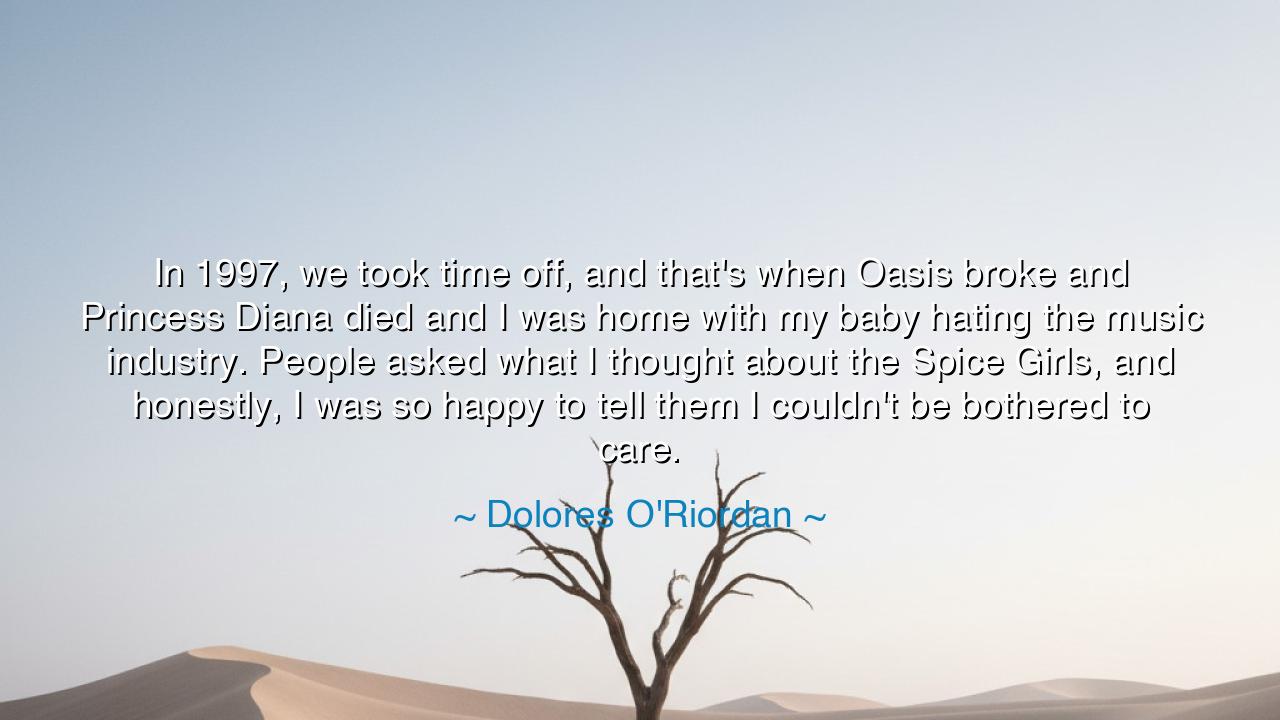
In 1997, we took time off, and that's when Oasis broke and
In 1997, we took time off, and that's when Oasis broke and Princess Diana died and I was home with my baby hating the music industry. People asked what I thought about the Spice Girls, and honestly, I was so happy to tell them I couldn't be bothered to care.






In the words of Dolores O’Riordan, there echoes not merely a memory of time, but the lament of a soul weary of the world’s noise. When she spoke of 1997, of Oasis, of Princess Diana, and of her own disillusionment with the music industry, she was not simply recounting events — she was bearing witness to the season of human transience, when fame, grief, and apathy wove together into a single thread. Her voice, like a prophet’s sigh carried upon the wind, told of the price of creation, of how even the most luminous artist may find herself lost in shadow, estranged from the very music that once set her spirit aflame.
In that year, the world shimmered and shattered. The rise of Oasis marked the height of modern bravado, a loud celebration of youthful rebellion, while the death of Princess Diana tore open the collective heart of a generation. And there, in the stillness of her own home, Dolores O’Riordan cradled her child — torn between motherhood and music, between tenderness and exhaustion. Her confession that she “hated the music industry” was not the bitterness of envy, but the sorrow of a warrior who had fought too long upon the same battlefield. For in every age, the spirit of creation grows weary when surrounded by the false idols of fame.
When she said she “couldn’t be bothered to care” about the Spice Girls, it was not disdain but liberation. It was the whisper of a sage who has seen the vanity of the world and chosen silence over spectacle. In those words dwells a profound truth — that not caring is sometimes the highest act of spiritual preservation. The ancients, too, spoke of this: the Stoic philosopher Epictetus taught that peace is found not by controlling the world, but by mastering one’s own heart. Dolores, in her quiet rebellion, embodied that very wisdom — the choice to withdraw, to preserve the sacred flame of the self when the outer world burns too brightly.
Consider the story of Diogenes, the philosopher who lived in a barrel and mocked the grandeur of kings. When Alexander the Great offered to grant him any wish, Diogenes merely replied, “Stand out of my sunlight.” In that refusal lay the same spirit as Dolores’s — the courage to turn away from the glittering emptiness of the age. She, too, was saying: Let me be. Let me breathe. The sunlight is enough. For those who live by the rhythm of creation, the soul must sometimes retreat from the noise to remember its own song.
There is a rhythm in this retreat, a sacred pulse that beats beneath all exhaustion. When one withdraws from the chaos, the heart rediscovers the purity of its calling. So it was for Dolores, whose voice carried both the anguish and beauty of a thousand storms. Her disillusionment was not an end but a cleansing — a return to simplicity, to love, to what truly mattered. It was a reminder that the artist’s first duty is not to the world’s applause but to the integrity of their own spirit.
From this reflection, let us draw a lesson: that there are times when stepping away is the most courageous act of all. When the world demands your constant presence, your opinions, your participation in its endless chatter — dare to be silent. Dare to rest. Let the noise pass like wind through a hollow reed, and listen instead to the quiet music of your own heart. For wisdom grows not in the glare of attention, but in the cool shade of solitude.
Therefore, dear listener, when your days grow heavy and your joy begins to dim, remember Dolores O’Riordan, and take time off from the world. Let the noise of fame, politics, and passion pass you by like distant thunder. Sit with your own child, your own soul, your own peace. Do not fear being forgotten — for in those sacred silences, you remember yourself, and in remembering, you are reborn.
Thus the quote is not a lament, but a torch passed from hand to hand across generations — a call to protect your inner light when the world burns too bright. To retreat is not to surrender, but to return to truth. And when at last you rise again, may your song — like hers — carry both the sorrow and the wisdom of having walked through the fire and found peace in the stillness beyond it.






AAdministratorAdministrator
Welcome, honored guests. Please leave a comment, we will respond soon